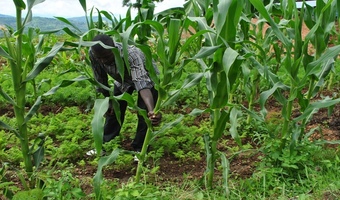 Timothy Kiongo has grown maize, beans and soya in his one hectare piece of land for the last 50 years. Every harvest he gets 25 bags of maize, but since 2010 he is lucky to even get five bags per hectare. Timothy is among thousands of smallholder farmers in Kenya who have been hit hardest by the vagaries of weather and are not sure of what to do next, even as institutions pass one law after another.
Timothy Kiongo has grown maize, beans and soya in his one hectare piece of land for the last 50 years. Every harvest he gets 25 bags of maize, but since 2010 he is lucky to even get five bags per hectare. Timothy is among thousands of smallholder farmers in Kenya who have been hit hardest by the vagaries of weather and are not sure of what to do next, even as institutions pass one law after another.
“The climate is changing—it is very clear,” said Mukusya, a leader of the Utooni Development Organization, a Mennonite Central Committee (MCC) partner organization. Formerly called Excellent Development, the Utooni Development Organization was formed in 1978 to help rural families improve food and water security by terracing land, building sand dams and planting trees.
“The majority of people here have no resources to cope with the situation,” he explained. “If we don’t make changes, we cannot survive.”
With assistance from MCC and other groups, Utooni Development Organization is helping rural families rediscover skills to grow, cook and store indigenous crops, such as millet, sorghum, cowpeas, cassava and sweet potatoes.
“Maize and beans used to grow well in our climate but we are now going back to the old crops which can withstand the drought,” he explained.
Rural families are also improving agricultural productivity and sustainability through building sand dams, reducing soil erosion, planting trees and other soil and water conservation projects.
“People are interested in making changes—everybody recognizes there is a need for change but the demand is bigger than we can reach,” explained Mukusya.
People most at risk of increased drought and other extreme events such as floods, hurricanes and cyclones, are those who are already experiencing poverty, live in vulnerable settings and have limited access to resources to help them cope with increased disasters, he said.
“For me, it is an equity issue,” said Guenther. “Those who are the least responsible for the crisis are most affected. How can we ignore it?”
Solutions are within reach but there needs to be political will to accept responsibility and accountability for actions that create hunger and hardships for people “who are already in precarious situations,” he said.
“These things are preventable—we need to show through our actions that as a Christian community we understand accountability,” said Guenther. “From a faith perspective, this is fundamental to what God calls us to do—to feed the hungry and to walk with the most vulnerable.”
In Canada, MCC is a member agency of Canadian Foodgrains Bank (CFGB), a partnership of 15 Canadian church-based agencies working to end hunger in developing countries.
CFGB and its member agencies are advocating that the new international climate agreement include measures to reduce greenhouse gas emissions, help countries adapt to unavoidable climate change and transfer clean technologies from industrialized countries to developing countries.
Mukusya is hoping that countries will act on the strategies that are developed. “When you talk about what you are going to do, are you going to do it or are you just preaching a gospel that you won’t execute properly?” he asked.
“For us, this is a matter of survival. God created abundant land. We need to find solutions to the destruction we have made for ourselves.”
- Hits: 11509
















Comments powered by CComment